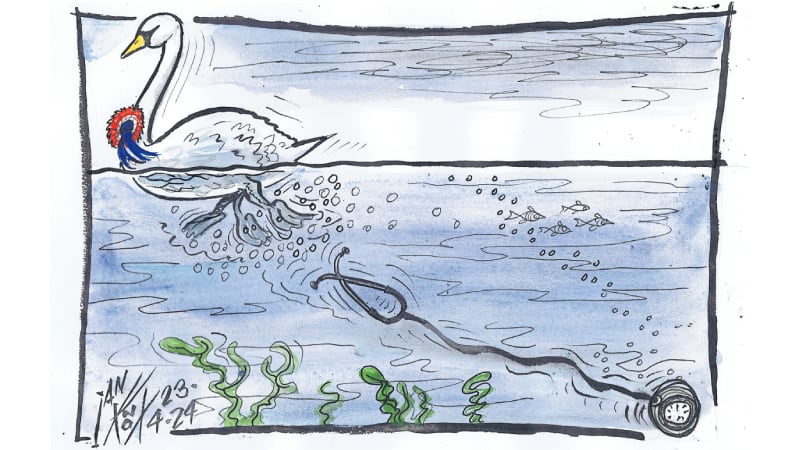A number of letters recently have attempted to address unionists and unionism in an Irish context. The 32-County Sovereignty Movement has also put thought into this and addressed political unionism in 2005. Our analysis then remains valid as we pose the questions today for genuine feedback and discussion.
It is obvious by any definition, against any international standard, the six-county region has failed. The issue of sovereignty needs to be addressed.
In consequence of this empirical view we pose the following questions: Is the ending of the union inevitable? Is the ending of the union probable?
Most unionists have contemplated these scenarios but appear to have avoided addressing them.
In December 2004 under the 30-year rule, British State papers revealed a proposal from the then British prime minister Harold Wilson for disengagement of the Six Counties from the United Kingdom. It was a proposal irrespective of repeated assurances from the British establishment that no constitutional change could take place except by the expressed wishes of the majority of its inhabitants.
Although the proposal floundered it underlined the fact that British interests, as they pertain to territories outside of their island, are not predicated on any semblance of democratic expression. The 1974 proposal was not an isolated incident. There is a profound mistrust between the unionist people and the British establishment.
Unionists within a British democratic framework must ask the following question: Does the ‘unionist veto’, a cause of conflict, guarantee the constitutional position of unionists within the UK?
Does such a framework offer unionists a democratic future?
Does such a framework exercise inclusive accountability for unionist people?
From our perspective we see unionism as a political reality in Ireland since the plantations of the 17th century.
Unionism has sought to dominate the economic and political landscape in Ireland both as a minority on the island and as a majority within part of it.
Notwithstanding the inherent injustice of this domination, the inescapable conclusion is that unionism as a political entity, gauged itself against an Irish political backdrop and not a British one.
In consequence we invite the broad unionist community to look at and formulate proposals on how an Irish democratic framework, given the reality of its probability, should be constructed to reflect the diversity of all the people on the island.
FRANCIS MACKEY
32-County Sovereignty Movement,
Omagh, Co Tyrone
Sweet talk of ‘practical and reasonable’ hard to swallow
I have a few questions for Michelle O’Neill regarding the policy on abortion as outlined by her in The Irish News (November 17).
She referred to a ‘restatement of current policy with additional features’. Additional features? Do she mean killing more babies in the womb? It seems that ‘additional features’ would involve that. Am I right or wrong?
It is ‘practical and reasonable’ she said, but is it practical and reasonable for babies in the womb?
Is it not that she thinks it is a practical and reasonable way to garner votes in Ireland of today, regardless of how many abortions are performed to achieve that aim? Even one abortion is too many.
I wonder will her supporters in Mid-Ulster swallow her sweet talk of a ‘practical and reasonable’ approach to more abortions and not speak out to defend the right to life of babies in the womb?
Does she think that the moral law should be shaped and formed by public opinion? Does she not think that God and his Church should have a significant say and contribution to make?
Should the moral law be merely man/woman-made or Michelle-made?
Where does the SDLP stand on this issue? Do they support Michelle?
Fr MARTIN KELLY PE
Carryduff, Belfast
SF’s illogical thought process
There is something about Gerry Adams recent revelation that abortion is the big thing that now must happen (November 6) and at the same time, carries on with the new mantra of equality, while party members such as Peader Tobin are denied a conscience clause. Given that their comrades are busy pushing for an end to equality of life in the South, this shows how illogical their thought process has become.
But there is something about our social and cultural viewpoints on abortion that mirrors these double standards. The example of social media going mad, with joy when a celebrity shows her ‘bump’ and yet if anyone voices that abortion is wrong the poison comes out with vengeance. One sees this in the inability to tolerate a different view as witnessed in Jacob Rees Mogg’s stance in defence of his Catholic faith on Good Morning Britain.
This confirms that the throwaway culture, previously reserved for clapped out TV sets or cars, is now directed towards those advocates calling out a different tune. This clearly is an annoyance to the likes of Mr Adams and other such deniers of truth, as mentioned above. However, unless views and thoughts that counter balance such mentalities are allowed, then we succumb to the ideological stance of the illiberal left, which wishes that together with rusted household appliances, innocent life too must be relegated to the scrape heap. Since without a basis that protects innocence of life, our future, advocated by Adams and his ilk, is clearly a recipe for moral dystrophy.
JDP McALLION
Clone, Co Tyrone
Shambolic
The controversial poppy pin worn by Taoiseach Leo Varadkar in Dáil Éireann last week, could best be described as a shampoppy consisting of a Flanders flower in the centre of a shamrock, a Christian symbol wrapped around a war glorifying miserable poppy.
This sad old-fashioned accessory was inspired by a poem which urged the combatants to carry on slaughtering and killing, this wretched symbol represents the brutality of war waged by the brutal British empire whether it be in Flanders fields or the Bogside. The wearing of this symbol shows total disrespect for those killed by the crown forces throughout the world. For those among us who wear this poppy be it for political correctness, or to remember the Irishmen who were duped to join the crown in the Flanders killing fields, I say wear with pride an Easter Lily which commemorates our revolution and the birth of our coveted republic.
FRANK GLYNN
Cricklewood, London
Rosary on the coast
THIS Sunday’s Rosary on the Coast invites everyone to go to the coasts of Ireland to pray the rosary for the preservation of the faith in Ireland and the protection of life in Ireland.
The aim is to encircle Ireland with a human rosary by having at least 53 locations around the coast. Locations can be found wwwcoastalrosaryireland.ie
Dr OWEN GALLAGHER
Glenavy, Co Antrim







